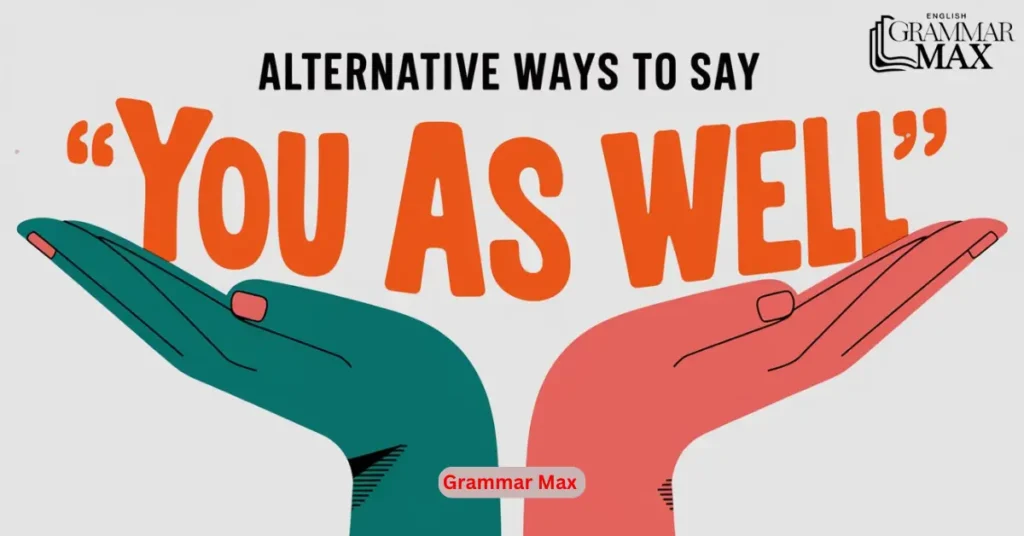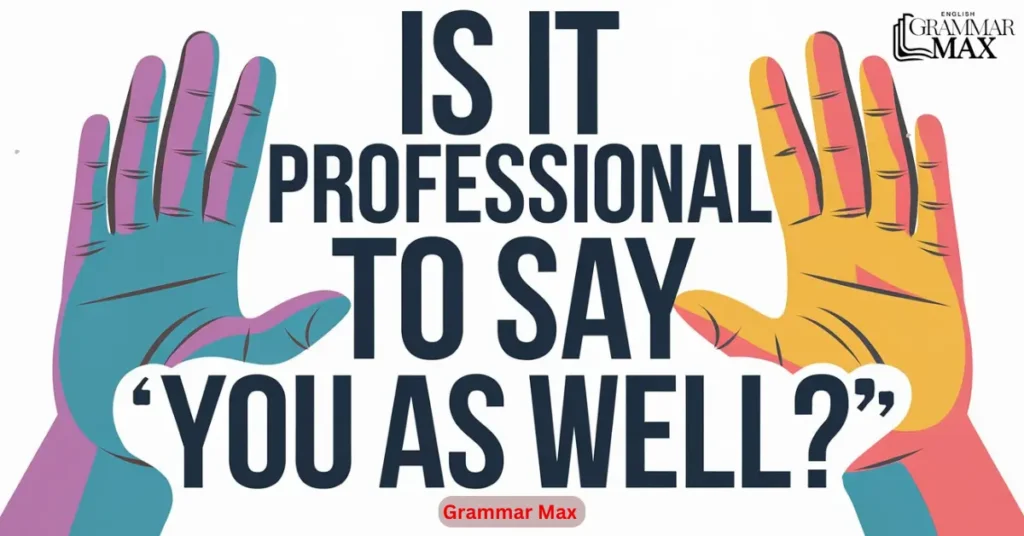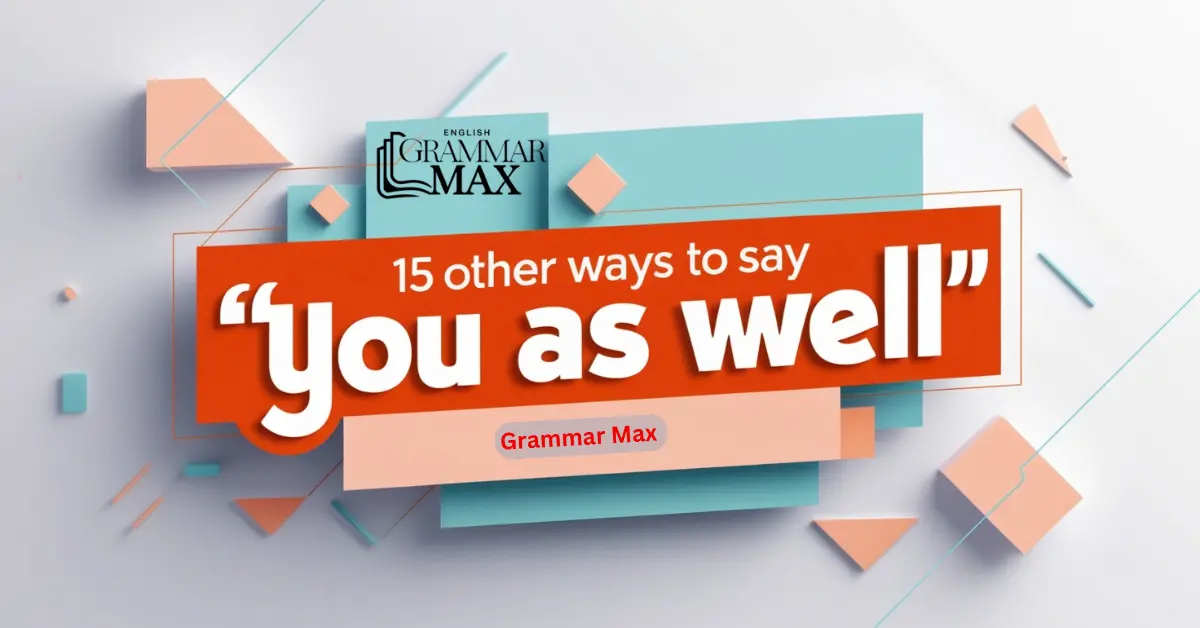You As Well is a polite phrase often used to respond to kind words, good wishes, or friendly greetings. The “You as well meaning” generally conveys that you are returning the same sentiment back to the speaker, whether it’s a friendly goodbye, a wish for good fortune, or a compliment. Using this phrase builds connection, showing that you are not only receiving their words warmly but also wishing the same back to them.
Understanding “What is another way to say as well” can help add variety and personality to your responses. In this article, we’ll explore alternative phrases for “You are as well” and discover new ways to convey a heartfelt or courteous response. These alternatives can be used in varied contexts whether you’re in a professional setting or a friendly chat adding a personal touch to your conversations.
Alternative Ways to Say “You As Well”

You can use these ways instead to say “You As Well”:
- Same to You
- You Too
- Back at You
- Right Back at You
- Likewise
- And You
- Ditto
- I Feel the Same
- Much Appreciated, Same to You
- Couldn’t Have Said it Better Myself
- I Wish the Same for You
- Sending It Right Back
- Happy to Share That with You
- It’s Mutual
- Here’s to You Too
Same to You
Same to You is a friendly way to reciprocate a positive sentiment, such as well-wishes or compliments. It’s a simple response that directly conveys that you wish the same for the person who addressed you.
This phrase is widely used because it’s versatile and fits into both professional and casual contexts. Whether replying to a friendly farewell or congratulating a colleague, “Same to You” provides a polite and efficient response.
Best Use:
Same to you works well in various contexts, especially when you want to reciprocate a positive sentiment directly and politely. This response is versatile, fitting seamlessly into both professional emails and casual conversations.
Example in an Email:
Dear Sarah, thanks for the well wishes on the project! Same to you for your upcoming deadline; I’m sure you’ll do great.
You Too
You too is perhaps the most common and casual response, ideal for friendly exchanges or everyday conversations. Its straightforward nature makes it quick to use, especially in relaxed settings.
Best Use:
You too is a quick and simple response, ideal for everyday exchanges. It’s perfect for replying to friendly greetings or well wishes, like “Enjoy your evening!” in both personal and informal chats.
Example in a Conversation:
“Enjoy your weekend!”
“You too!”
Back at You
Back at You is a friendly, informal way to return a sentiment or compliment. This phrase is often used in casual conversations to respond warmly to a wish, greeting, or positive remark.
Typically, “Back at you” adds a lighthearted touch, showing that you’re echoing the same good feelings. It’s best suited for friendly exchanges with people you know well, such as friends, family, or close colleagues.
Best Use:
Back at you is slightly more playful, making it suitable for informal settings or friendly texts. It’s great for reciprocating compliments or positive remarks, especially with close friends or colleagues you know well.
Example in a Text Message:
“Hope you have a great day!”
“Back at you!”
Right Back at You
For a more enthusiastic version, try Right back at you. This phrase implies warmth and appreciation, making it a lovely choice for close friends or family.
Best Use:
For a warmer, more enthusiastic tone, Right back at you is a wonderful choice. Use it in friendly exchanges where you want to return well wishes energetically, such as “Good luck on your project!”
Example in a Casual Setting:
“Wishing you lots of luck!”
“Right back at you!”
Likewise
“Likewise” is a versatile term used to convey agreement or reciprocation of a sentiment. It implies that the speaker shares the same feelings or wishes as the person they are responding to, making it a polite way to acknowledge good wishes or compliments.
In professional or casual settings, using “likewise” maintains a respectful tone while allowing for a warm exchange. For example, if someone says, “It was great working with you,” responding with “Likewise” shows appreciation and mutual respect for the relationship.
Best Use:
Likewise is polished and professional, making it ideal for formal settings or polite emails. It’s a versatile phrase that conveys mutual respect, often used in workplace interactions or when responding courteously.
Example in an Email Response:
“Thank you for your support, John. Likewise, I appreciate your commitment as well.”
And You
And you is a quick way to return the sentiment. This phrase is straightforward and easily adaptable to different tones, whether formal or informal.
Best Use:
And you is a quick, neutral response, ideal for short casual conversations. This phrase is adaptable, fitting easily into both friendly texts and everyday exchanges where a simple, direct reply is appropriate.
Example in a Friendly Message:
“Take care!”
“And you!”
Ditto
Ditto is an informal expression used to indicate agreement or to convey that you share the same sentiment as someone else. It often serves as a quick, lighthearted way to reciprocate a compliment or good wish, making conversations feel more casual and friendly.
In everyday interactions, saying “ditto” can create a relaxed atmosphere, as it avoids the need for lengthy responses. However, it’s best used among friends or in informal settings, as it may not be appropriate in more formal or professional environments.
Best Use:
For a bit of humor, Ditto is a unique, informal response. It’s perfect for close friendships or relaxed settings, where a lighthearted reply is appreciated and shows a sense of camaraderie.
Example in a Friendly Exchange:
“Hope your presentation goes well!”
“Ditto!”
I Feel the Same
“I feel the same” is a heartfelt response that conveys agreement or shared sentiment. This phrase emphasizes empathy, showing the speaker that you relate to their feelings or thoughts on a particular matter, whether in casual conversations or more serious discussions.
Using this expression can strengthen connections in conversations by demonstrating that you not only hear the other person but also understand their perspective. It is often used in response to expressions of gratitude, excitement, or concerns, making it a versatile phrase for both personal and professional interactions.
Best Use:
When you want to express that you genuinely share the same feelings, I feel the same is a heartfelt option. This phrase is warm and emphasizes connection.
Example in a Heartfelt Note:
“Your support means a lot to me. I feel the same about you!”
Much Appreciated, Same to You
This polite phrase works well in formal contexts. Much appreciated, same to you shows gratitude and reciprocates the sentiment in a courteous way.
Best Use:
“Thank you for your support on the project. Much appreciated, same to you for your hard work and dedication.” This response acknowledges their gratitude while reciprocating the sentiment.
Example in a Business Email:
“Thank you for your assistance. Much appreciated, same to you as we work on this together.”
What Is the Meaning of “You As Well”?
“You as well” is a common phrase used to reciprocate a greeting, wish, or compliment. When someone says, “Have a great day!” replying with “You as well” politely sends the same sentiment back.
This phrase can be used in both formal and informal settings due to its friendly yet neutral tone. It’s a quick way to acknowledge and return good wishes in everyday conversations or professional interactions.
Is it Professional to Say “You As Well”?

Using “You as well” in professional settings can be both polite and versatile, especially when reciprocating well-wishes or compliments. The phrase is friendly yet neutral, making it suitable for emails, meetings, or casual professional exchanges. However, in highly formal environments, some may consider it too informal, and a more polished alternative like “Likewise” or “Same to you” may be preferable.
Pros
- Friendly Tone: Conveys warmth and approachability.
- Versatile Use: Suitable for various professional settings.
Cons
- Potential Informality: Can seem too casual in formal environments.
- Lack of Specificity: Might appear vague or non-committal in some contexts.
Frequently Asked Questions
Is it correct to say “you as well”?
Yes, it’s correct and commonly used to reciprocate a greeting, wish, or compliment in both informal and professional settings.
Can you reply with “you as well”?
Absolutely, replying with “you as well” is a friendly, concise way to return a sentiment, especially in casual exchanges.
Is it correct to use “as well”?
Yes, “as well” is grammatically correct and used to mean “also” or “in addition” in both spoken and written English.
How do you use “as well”?
“As well” is typically used at the end of a sentence to add another item or idea, as in “She enjoyed the movie, and the dinner as well.”
Conclusion
In our daily interactions, finding ways to say “You as well” can help make our responses feel fresh and personal. Each of these variations brings a unique flavor to your conversation, allowing you to respond to greetings or kind words with a tailored tone that suits the context.
The next time you’re prompted to respond, try out some of these alternative phrases. With options ranging from polite to playful, these responses can add warmth, friendliness, and personality to your interactions, keeping your conversations engaging and meaningful.

William Henry is a writer for Grammar Max, a blog that focuses on synonyms and phrases. He loves exploring the quirks of the English language and enjoys helping readers improve their vocabulary. William’s articles are easy to read, fun, and full of useful tips for anyone looking to better understand and use English. Whether you’re a student, a professional, or just someone interested in language, William’s writing on Grammar Max makes learning about words and their meanings simple and enjoyable.
